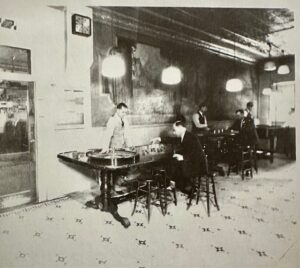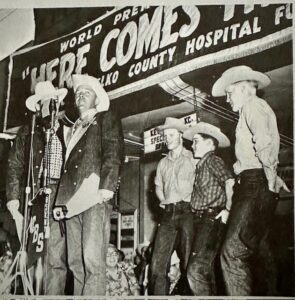Time Travel Tales: Big Name Entertainment
Submitted by Jan Petersen
On Election Day in November 1918, Nevada voters considered voted on a ballot measure known as the “Wet and Dry” question, asking whether to prohibit alcohol consumption or sales in the state. Earlier that year, Congress had passed the proposed 18th Amendment for national prohibition, also known as the Volstead Act and sent it to state legislatures for ratification. The dry side won with nearly 60 percent of the vote. Yes, even in Nevada. The 18th Amendment was ratified January 16, 1919.
 Saloons across Nevada were ordered closed, including many from the pioneer days in Reno, Virginia City, Tonopah, Eureka including the Commercial Hotel in Elko and the rest of the county. Some converted to “soft drink” parlors or “fruit stands.”
Saloons across Nevada were ordered closed, including many from the pioneer days in Reno, Virginia City, Tonopah, Eureka including the Commercial Hotel in Elko and the rest of the county. Some converted to “soft drink” parlors or “fruit stands.”
By 1923, the Nevada Legislature’s realized this experiment in regulating morality wasn’t working and repealed the state’s four-year-old prohibition law. Since Nevada no longer had a prohibition statute, state, county and local police officers in Nevada technically were not duty bound to enforce national prohibition laws. The “soft drink” parlors continued with “near beer,” underground speakeasies, and stills in the outlying valleys. There was the occasional raid but nothing dramatic.
After the Nevada repeal, enforcement of Prohibition-especially in the rural areas – became more… or less… a federal matter, with periodic enforcement from local officers. Enforcement in rural Nevada became casual at best. (Elko County alone has 17,173.3 square miles, many in extremely remote areas). For some, selling homemade liquor was a means of economic survival.
In 1925, Nevada completed the modernization of state’s system of roads with 1,000 miles of the Victory and Lincoln Highways. Governor James G. Scrugham established Elko airport as the terminus for the first scheduled airmail run in America. Elko was the economic center for northeastern Nevada. With the completion of the highway system, there was great opportunity to take advantage of the traveling public and the emergence of automobile tourism.
Newton Crumley Sr., originally from Georgia, made his fortune during the mining boom days of Jarbidge and Tonopah. His wife, Lee, was a native of Belmont, in Nye County. Their only child, Newton Hunt Crumley, Jr. was born in Tonopah in 1911 and attended schools there and the University of Nevada.
The Crumley’s decided to return to Elko County in 1925 and negotiated with William Doyle, to purchase of the Commercial Hotel. The hotel opened as the Humboldt Lodging House in 1869 and was renamed the Commercial in the mid 1890s. After some wheeling, dealing and wrangling, a deal was made for $70,000. The Crumleys moved to Elko and made improvements to the hotel with the construction of a three-story addition in 1926 and another in the late 1930s. The family made their home at the hotel in a custom two-bedroom suite on the third floor.
Technically, the Prohibition laws were still on the books but enforcement was not a priority and a speakeasy operated in the basement of the hotel. (Because no records kept on illegal speakeasies, stories come from off-hand information and oral histories). The crash of the stock market in October of 1929 affected rural Nevada as well. Times were tough.
Elko was the financial and business center for northeastern Nevada. The Commercial, in the center of town and near both railroad depots, was a convenient place to stay for rural people coming to town as well as the growing automobile tourism adventurers. Adult beverages were available and gaming was offered.
THEN….in 1931, gaming was legalized throughout Nevada. This legitimized gambling at the Commercial. Table games and slot machines were introduced. After 10 years of uncertainty and periodic enforcement of the federal liquor laws, the 21st Amendment rescinded Prohibition on December 5, 1933. It was no longer necessary to hide stills in back sheds, remote valleys and cellars. Near beer became real beer. Soft drink parlors and “fruit stands” returned to their former businesses as bars. Life returned to normal – as far as alcohol sales were concerned. The Depression was still present and the nation’s financial stability was still very quavery.
In 1941, the Crumley family had connections to entertainers in the Hollywood area. They made arrangements to have famed big band leader, Ted Lewis and his orchestra appear at the Commercial Hotel. It was an instant hit!
Other bookings soon followed throughout the 1940s. It was the big band era. Paul Whiteman and his band performed. Newspapers referred to him as the “King of Jazz”.

Sophie Tucker a, former vaudeville performer, was booked at the Commercial. It was unusual for a woman singer to appear solo. Pianist Ted Shapiro accompanied her. Sophie has a brassy style and made jokes about her ample size. She was an independent woman and proud of it.
Also appearing were the Marx Brothers. They were an American family comedy act that had been successful in vaudeville and as a performing act. The group is widely considered to be among the greatest and most influential comedians of the 20th century.
As the 1940s ended, the big name acts continued. Crowds from out of state came to Elko to see these big name entertainers. It was a brilliant idea that took off like wildfire. One part of the performers contracts was that they had to give a free show for the youth of Elko…and they did.
Bing Crosby purchased the PX ranch from the Crumly family in the late 1940s. It was a great get away from the Hollywood scene. In Elko and at the ranch, he was just another resident. Bing arranged for a world premier of “Here Comes the Groom” movie in 1951. Movie stars made appearances and $10,000 was raised to benefit a fund for expansion of the Elko hospital.
 In the late 1950s, Jerry Newton and younger brother, Wayne Newton were booked. Wayne under age and couldn’t hang out in the casino. Butch Edison remembered having cherry cokes with him in the coffee shop.
In the late 1950s, Jerry Newton and younger brother, Wayne Newton were booked. Wayne under age and couldn’t hang out in the casino. Butch Edison remembered having cherry cokes with him in the coffee shop.
Also during the late 1950s….Ice Follies in the Commercial. A small rink with refrigeration was built and performances held.
At the Ranchinn, during Vikki Carr’s early days, she didn’t make much money as a lounge singer. She also worked the front desk at the Ranchinn and lived with Dutch and Eileen Holdren to make ends meet.
In the 1960s the Matys brothers, John, Walt, Emil and Gene, performed on American Bandstand. They later moved to Elko and toured the west, playing in casino lounges. After retirement, Emil was active helping Elko High School musicians.
Beginning in the early 1950s, other communities in Reno, Lake Tahoe and Las Vegas realized that Elko’s idea of booking big name singers and entertainers to perform in their casino was probably a great idea. Harolds Club and Harrahs Casino in western Nevada and the casinos in Las Vegas began booking performers as well. The idea was an instant success. AND…the rest is history. BUT….remember, it all started in Elko!
Information for this story taken from Northeastern Nevada Society Quarterlies 1979 – Crumley story by Chris Sheerin and Fall 1982 “It Began in Elko” by Angela Aguirre. Also information from Nevada Magazine, Elko Free Press and Elko Independent.